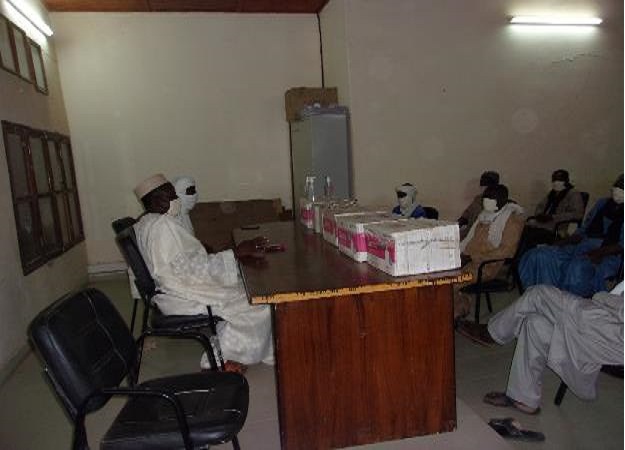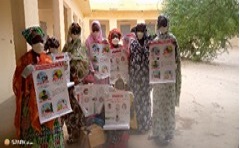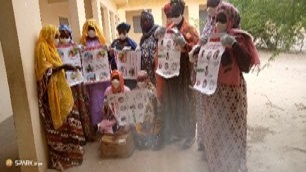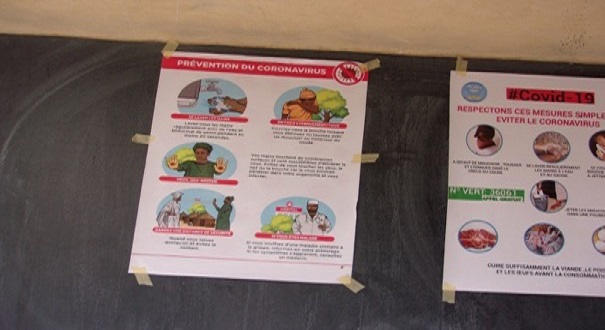Hay2Timbuktu has administered some twenty thousand pounds worth of Covid response grant aid, courtesy of the Welsh government, to the people of Timbuktu.
Grants were sought on the basis that women in Timbuktu have been identified as constituting potential in terms of persuasiveness to introduce change in the community if they are properly trained and equipped with information.
Since 2012 many women have become heads of households. They move about most, often fetching water, buying and selling in the markets daily thereby sustaining the community by providing livelihoods and food for the family.
The grant was secured to provide hygiene equipment for use in the markets, training for women in key roles and radio messages broadcast so that women in households received accurate information on health and hygiene measures in relation to Covid 19.
The anticipated results were in strengthening the resilience of women and their families to the spread of Covid 19, in facilitating the safe buying and selling of foodstuffs and the use of good hygiene practices and barrier methods of protection.
Prior to the establishment of the project AMSS held a seminar for community leaders to ensure ownership of the project and to determine the effective use of the resources in helping to combat the effects of Covid 19.

EQUIPMENT
The grant has been used for providing masks, gloves and gel for the market location
RADIO BROADCASTS
Radio messages have been secured with 3 local radio stations namely Radio Boctou, Radio Jamara and Radio Lafia using the health messages broadcast by Farm Radio International based on texts from the World Health Organisation. In each case the radio broadcasts were carried out in French, Tamasheq and Sonrai.
Radio Jamara broadcast twice daily for 3 months, Radio Boctou transmitted messages 4 times each week, twice each day between September and December and Radio Lafia transmitted 3 times daily changing the language order between its 10am, 6pm and 8pm broadcasts.
The broadcasts also contained information on the hygiene measures being undertaken in the schools in Timbuktu in order to persuade parents to send their children back to school when the schools reopened after closure for several months due to the pandemic.
The listening rate for these messages in the Radio Lafia area is estimated at 95% of 198,000 listeners in the Urbaine, d’Alafia, Bourem, Inaly, Salam and Ber communities. There will be some overlap with the other two radio stations but their coverage is similarly estimated.
TRAINING
Workshops were run for women during August by medical personel. Five full-day workshops for 125 women in groups of 25 were led by Dr. Mahamane Toure . The workshops focused on signs and symptoms of the disease, transmission and incubation including hygiene measures personally using barrier methods, behaviour through social distancing and care in the preparation and sale of food . The women were urged to prepare their communities, not to advocate discriminatory attitudes, to control identified cases and limit transmission chains through prevention and quarantine. They were reminded that the virus targets the most vulnerable and were reminded that health systems and hospitals should be preserved. There have been reports of patients being treated in tents outside the hospitals in temperatures above 45 degrees and testing being very limited by sending tests for analysis in neighbouring countries via UN weekly flights and on buses. This situation was eased in June by the establishment of a testing centre in the city.
Dr. Toure reported that the workshops went well and reflected the active participation of stakeholders through the interest shown. Participants expressed gratitude to the funders and expressed the hope that the partners would achieve their goals for the rebuilding of social capital.


Ms. Agaichatou said “ May Allah bless AMSS and H2T for organizing this training. Since the outset of this health crisis in our city there was mistrust between us and our customers because none of us were protected against the disease. The training gave us the opportunity to come together, talk to each other and lift the mistrust and fear that has damaged our relationships “
The women were given posters and leaflets to use with other women in the markets in order to extend the reach of the training workshops to a wider audience.

Accurate figures for cases in Timbuktu are difficult to obtain. Many cases will not have been reported due to stigma associated and people not believing that illness or death is as a result of Covid 19. However the figures for Mali suggest that between April and July there was a daily increase in the number of reported cases, early July recording the highest number of daily cases. Between July and October cases remained low but began increasing during October and November with cases reported at the end of November being the highest recorded.
Anecdotally contacts in Timbuktu report that cases are low in women and young people, those having suffered from the virus having recovered and no deaths reported.
A second grant from Welsh Government Wales for Africa Covid 19 Adaptation Round administered by WCVA was received in the spring. This grant was in response to requests from Timbuktu to utilise the proven methods of radio messaging, training and the provision of equipment to engage women and girls in participating in Covid 19 response planning.
Radio messages aimed at re-engaging girls in school to avoid an upsurge in dropout rates were prepared. These messages were transmitted through three local radio stations using French and local languages to emphasis the safe return to schools following a year of disruption. During this time girls had been engaged in household, domestic tasks with the risks of domestic violence and early marriage which would reverse 12 years of progress with womens rights and equality.
Training for girls and mothers in the communities in which H2T 4 partner schools are located was planned and delivered. The training focused on the issues of Covid 19, signs and symptoms, hygiene measures and information on other transmittable diseases, womens health and gender based violence. This training cannot be carried out remotely since the provision of equipment, Internet connection and electricity disruption make it impossible. Face to face training with Covid 19 precautions was planned enabling women and girls to develop strategies and practice methods of participating in and leading response planning and decision making.
During the pandemic work in the CSCOMS (clinics ) has been compromised and support for clinics was requested. The work of the women in the clinics cannot be delivered remotely so PPE was provided for those working and visiting the clinics in the communities where the 4 partner schools are located. This has enabled those who work in the clinics to address the health and social issues faced by girls and women as a result of the pandemic, to address the immediate effects of interrupted health care and to ensure longer term recovery.
